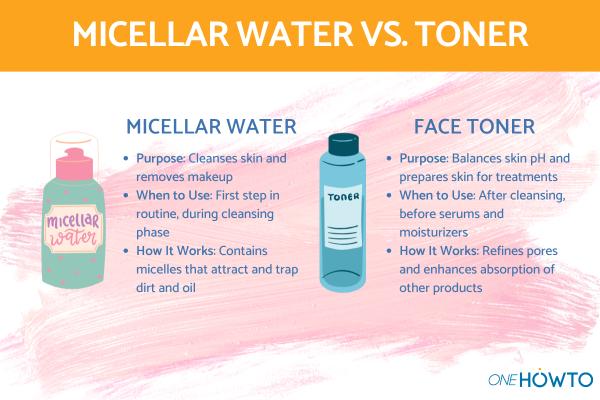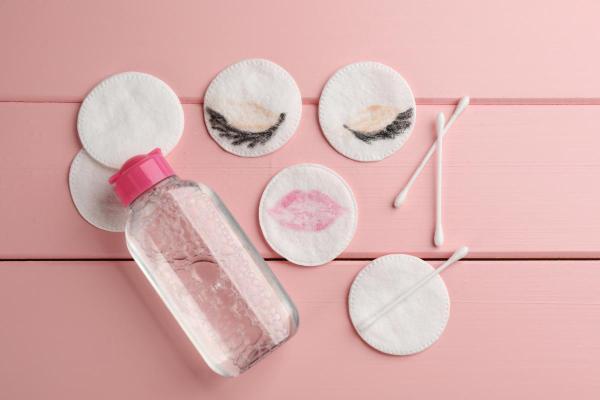What Are the Differences Between Toner and Micellar Water?


If you've ever found yourself standing in the skincare aisle, confused about whether to choose toner or micellar water, you're not alone. These popular skincare products often look similar in their clear liquid form, but they serve distinct purposes in your daily routine. Understanding their differences will help you make better choices for your skin and potentially improve your overall skincare results.
The following article by oneHOWTO explains the differences between toner and micellar water, their different properties and how you can incorporate both into your face care routine
What is the science behind Micellar Water?
Micellar water has an interesting history. It originated in France during the 1990s when harsh tap water was causing skin problems for many people. This gentle cleanser contains tiny oil particles called "micelles" suspended in purified water, which work like magnets to attract makeup, dirt, and excess oil without stripping your skin's natural moisture.
The science behind micellar water is fascinating. The micelles have both hydrophilic (water-loving) and hydrophobic (water-repelling) properties, allowing them to capture impurities effectively. This unique structure enables micellar water to cleanse without the need for rinsing, making it incredibly convenient for many users, especially when traveling or when you need a quick cleanse.
Most micellar waters don't just contain micelles, many formulations include additional beneficial ingredients like rose hydrosol, witch hazel, and aloe vera that help soothe and hydrate the skin while cleansing. This makes micellar water suitable for all skin types, including those with sensitive skin that might react negatively to traditional cleansers.
What is face toner?
A facial toner is a water-based liquid that helps rebalance your skin's pH after cleansing. Traditional toners were once heavy on alcohol and primarily used to remove excess oil. Luckily, modern formulations have evolved significantly. Today's toners do much more than just refresh your skin, they're an essential step that prepares your face for the rest of your skincare routine.
Good toners restore your skin's natural pH balance after cleansing, remove any remaining traces of dirt or cleanser, and help refine the appearance of pores. They also prepare your skin to better absorb subsequent products while providing an additional layer of hydration.
Many contemporary toners contain beneficial ingredients like antioxidants, gentle exfoliants, and moisturizing agents that nourish rather than strip the skin.
Unlike their alcohol-heavy predecessors, modern toners are specifically developed for different skin types. Whether you have dry, oily, combination, or sensitive skin, there's likely a toner formulated to address your specific concerns.

Is a tonic the same as a toner?
The main difference between these products is pretty simple: micellar water is mostly for cleaning, while toner helps to rebalance your skin. Think of micellar water as your makeup remover and general skin cleanser, getting rid of dirt and impurities. Toner, on the other hand, comes after you cleanse, working to bring your skin's pH back to normal and get it ready for the next steps like serums and moisturizers.
Their ingredients reflect these different purposes. While micellar water contains micelles that attract impurities, toners can contain various ingredients depending on their specific function. Hydrating toners may include hyaluronic acid or glycerin, exfoliating toners often contain gentle acids like AHAs or BHAs, and calming toners might include ingredients like aloe vera, chamomile, or green tea extract.
This difference in purpose directly affects how and when you should use each product in your skincare routine. Micellar water works best during the cleansing phase, either as your first step to remove makeup or after your cleansing gel to ensure no residue remains.
Toner comes into play after your skin is clean, helping to rebalance and prepare it for the treatments that follow.
Both products can work well for all skin types, though you may want to choose specific formulations based on your skin's needs. If you have oily skin, you might benefit from micellar water that targets excess oil and a toner with mild astringent properties. For dry skin, look for hydrating micellar waters and alcohol-free, moisturizing toners. Those with combination or sensitive skin should seek balanced formulations that won't irritate or dry out certain areas.
Now that you understand cleansing and toning, discover the next essential step in your skincare routine that helps remove dead skin cells and reveal a brighter complexion.

How to incorporate both products in your routine
Many skincare enthusiasts wonder if they can or should use both toner and micellar water. The answer is absolutely yes, these products are complementary and work well together in a skincare routine.
The ideal sequence starts with micellar water applied with a cotton pad to remove makeup and surface dirt. If you wear heavy makeup, you might follow this with a traditional cleanser for a thorough double cleanse.
Once your skin is clean, apply toner with gentle patting motions to rebalance pH and prepare your skin for the next steps. From there, you can continue with your treatments (serums, essences, etc.), moisturizer, and sunscreen during the daytime.
This approach ensures your skin is both thoroughly cleansed and balanced, creating the perfect canvas for the rest of your skincare products to work effectively. However, if you're pressed for time or prefer a minimalist routine, you might choose one over the other based on your immediate needs.
Micellar water shines when you need a quick, convenient cleansing option, especially for removing makeup or when you don't have access to running water. It's also excellent for very sensitive skin that reacts to traditional cleansers or for a gentle morning cleanse when you don't need intense cleaning.
Toner becomes valuable when you want to rebalance your skin after using a cleanser or target specific skin concerns with specialized formulas. It's also helpful when you want to add an extra layer of hydration, prepare your skin to better absorb subsequent products, or refine the appearance of pores.
After cleansing with micellar water or applying toner, your skin might benefit from gentle exfoliation. Learn how to create an effective homemade scrub using ingredients you already have in your pantry.
If you want to read similar articles to What Are the Differences Between Toner and Micellar Water?, we recommend you visit our Beauty & Personal Care category.






